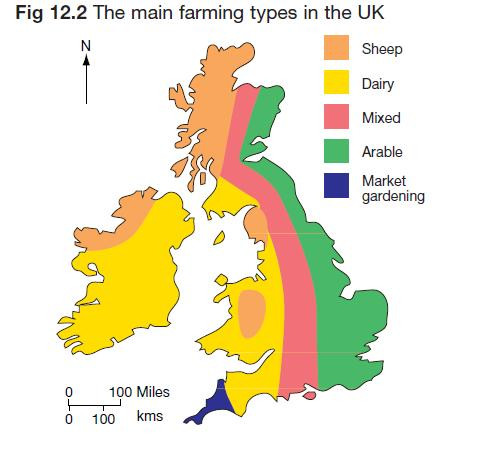Distribution of farming types in the UK
Each part of the UK tends to have a particular type of farming.

Note: It will be helpful if you know five case studies, one for each of these types of farming.
Dairy farming
This involves the rearing or purchase of cattle for the production of milk. It is mainly found in south-western England, the lowland areas of Wales and in Lancashire. Dairy farmers prefer fertile, well-drained soils that produce high quality grass. Dairy farms supply milk to nearby urban areas as well as to dairies for the production of milk products such as butter and cheese. The production of milk has been subsidised since 1945 but the quantity farmers are allowed to produce has been limited by quotas since the 1980s.
Arable farming
Arable farmers plough the land to produce cereal crops such as wheat and barley, vegetables, oil seed rape and linseed. Arable farms are mainly found in eastern England, including Norfolk and Lincolnshire, as well as the east of Scotland. The farmers use machinery and so prefer flatter land. An ideal climate has warm summers with rain during the summer growing season. Arable crops attract guaranteed prices through the Common Agricultural Policy (CAP) of the European Union.
Sheep farming
Sheep produce meat and wool. Sheep farms, which are mainly family run, are found in the upland marginal and peripheral areas of England, Wales and Scotland. Sheep farming can take place on steep slopes, with thin soils, high rainfall and low temperatures. The sheep feed on the poor grass that grows on the moorlands. Hill sheep farms receive subsidies from the EU and some farmers earn extra income from campers and caravan users. The lambs produced each February and March are taken to lowland farms to be fattened for sale as meat.
Market gardening
This is intensive farming, producing high-quality crops such as fruit, salad, vegetables and flowers. It can be found in Cornwall and Devon, the Isles of Scilly, and the Fens. Farms may be as small as one hectare. Market gardeners use climate-controlled glasshouses, artificial soils and irrigation to obtain a high quality output which is taken to markets in refrigerated lorries.
